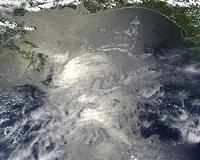 |
Baghdad (UPI) Oct 1, 2010 The chief of security in southern Iraq, where two-thirds of Iraq's oil reserves lie, has warned that a resurgent Islamist militant organization allied with al-Qaida is expected to target the oil industry, the key to the country's reconstruction. "We have received information indicating that there is a plan to target a number of oil facilities," Ali al-Maliki, president of the Security Committee of the Basra Governorate Council, was quoted as saying by the pan-Arab Asharq al-Awsat newspaper. "The security agencies in the governorate are dealing with this information with extreme interest and a new security plan has been laid down to properly protect these facilities." Maliki said the plan targeting oil facilities had been drawn up by the Islamic State of Iraq, closely linked with al-Qaida in Iraq. ISI was thought to have been dealt a death blow in April when its leader, Abu Omar al-Baghdadi, and its military commander, Abu Hamza al-Muhajr, were killed. The organization, like AQI, had been further weakened since 2007 by the defection of thousands of Sunni tribesmen who joined U.S.-organized Sahwa (Awakening) Councils and turned on the jihadists, killing or capturing hundreds of them. But a recent spate of major attacks on government buildings, military bases and Sahwa leaders as well as suicide bombings of crowded markets and mosques has underlined that these jihadist groups remain a potent force capable of mounting complex operations. In the fierce, multi-faceted insurgency that followed the 2003 U.S. invasion, the oil industry, Iraq's economic lifeline, came under intense attack that reduced production -- and vital exports -- to a trickle. That, in turn, caused immense hardship by slashing electrical output, which affected every facet of life, from heating to sewage. "In the context of the withdrawal of U.S. troops, the continuing political impasse in Baghdad and increasing concerns surrounding Iranian influence on Arab Sunnis, it is expected that al-Qaida will link its activities in Iraq with its global objectives," said Arab analyst Murad Batal al-Shishani. These include Osama bin Laden's repeated calls for economic war against the United States and its regional allies. In an analysis for the Jamestown Foundation, a Washington think tank that monitors global security, al-Shishani wrote: "If al-Qaida targeted oil facilities in Iraq, as predicted by Ali al-Maliki, it would deepen the crisis of the state on one hand by increasing social tensions and frustration by affecting oil-related energy supplies such as electricity, gas and fuel, while on the other hand affecting the international dimension of Iraq's oil industry, for example oil prices and foreign investment in Iraq." Iraq's southern fields would be a prime target. Many of the international energy giants awarded 20-year production contracts in Iraq's biggest oil fields will be located there and along the eastern border with Iran. Baghdad plans to boost production from 2.4 million barrels a day to 10 million-12 million bpd over the next six years to pay for the massive reconstruction needed to make Iraq a top oil producer. Sabotaging those fields or driving off the oil companies would cripple U.S. efforts to turn Iraq into a functioning democracy and cut off a major source of oil. Iraq has proven oil reserves of around 115 billion barrels but twice as much is believed to remain unexplored and untapped -- making Iraq the big prize as other producers' reserves are dwindling, a strategic asset of immense importance. Without foreign investment, expanding Iraq's oil potential cannot be realized. Indeed, a recent posting on a jihadist Web site by an activist calling himself Abu Abdullah al-Batar, specifically called for attacks on the foreign companies, including BP, Total of France and others, "which are investing in developing the oil fields of southern and northern Rumaila, Majnoon and Halfaya." Al-Batar urged ISI to hit Iraq's oil infrastructure "to break the backbone of the Iraqi rafidah" -- meaning the "rejectionist," or Iranian-backed, Shiite-dominated -- "government because oil revenues are the lifeblood of this government." Al-Shishani concluded that "targeting oil facilities seems to be a strategic alternative for the Salafi-jihadis to enable the continuation of their war against the United States and the West while punishing the national government. "This could, by increasing frustration among Iraqis, help ISI/al-Qaida regain its lost locations inside Iraq."
Share This Article With Planet Earth
Related Links Powering The World in the 21st Century at Energy-Daily.com
 Oil from BP spill traveled 500 kilometers: scientists
Oil from BP spill traveled 500 kilometers: scientistsMiami (AFP) Oct 1, 2010 Traces of oil from a ruptured BP well in the Gulf of Mexico have been found at a depth of 1,000 meters (3,200 feet) and up to 500 kilometers (300 miles) from the spill site, according to a new analysis. A team of scientists aboard the Greenpeace ship Arctic Sunrise reported results Thursday from 10 days of sampling around areas affected by the worst oil spill in history. "From the measur ... read more |
|
| The content herein, unless otherwise known to be public domain, are Copyright 1995-2010 - SpaceDaily. AFP and UPI Wire Stories are copyright Agence France-Presse and United Press International. ESA Portal Reports are copyright European Space Agency. All NASA sourced material is public domain. Additional copyrights may apply in whole or part to other bona fide parties. Advertising does not imply endorsement,agreement or approval of any opinions, statements or information provided by SpaceDaily on any Web page published or hosted by SpaceDaily. Privacy Statement |